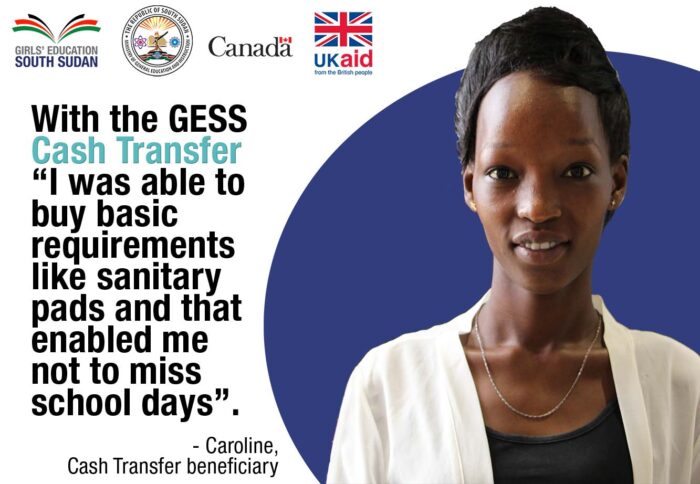GESS Cash Transfer Helps Beneficiary Progress to University
April 19, 2021 10:06 am“When we heard that the cash will soon be distributed, myself and my friend Achol got very excited, (we) sit down and plan out what we will buy among the many things that we lack.”
Caroline, former GESS Cash Transfer beneficiary recalls how the money she received helped her during her time at secondary school: “I was able to buy basic requirements like sanitary pads and that enabled me not to miss school days”.

Caroline is an example of one of many South Sudanese girls who may have dropped out of school without the financial support of the Cash Transfer. This financial boost, along with hard work and determination, saw Caroline pass her South Sudan Certificate of Secondary Education (SSCSE) in 2020. She didn’t stop there – she now studies economics at the University of Juba and hopes to be become an accountant.
Caroline had a tough upbringing. She was raised by a single mother who, as a primary school teacher, values education. Despite her background, Caroline’s mother didn’t always have the financial means to send her and her siblings to school. As the oldest sibling, Caroline would always reserve a small amount of the Cash Transfer for her siblings. This is a common trend across the country where older siblings are expected to support their parents in raising the younger children. Faced with such pressures, many girls resort to early marriage to support the family through the bride price.
However, Caroline did not succumb to this devastating tradition. Instead, she started a small business selling snacks. This money helped to pay her tuition fees, allowing her mother to focus on her sibling’s school fees. Caroline is confident that completing secondary school has helped her to develop ideas on how to raise money to join university.
Many of the complex factors that drive child marriage are exacerbated in emergency settings, such as the COVID-19 pandemic. Experience from other emergency contexts, including the Ebola crisis, highlights the need for urgent action both to prevent and respond to the vulnerabilities faced by girls and women, including risks from early and forced marriage[1].
GESS continues to support girls across South Sudan to ensure they can meet their needs during this difficult time. The Cash Transfers to girls are an incentive to stay focused and to engage in learning at home so that they do not fall behind, and so that they can return to schools when they reopen.
[1] Menéndez, C. Et al. ‘Ebola crisis the unequal impact on women and children’s health,’ 2015, The Lancet, Volume 3, Issue 3, p.130.
Tags: Cash Transfers, Covid-19, Development, education, EducationCannotWait, FCDO, girls' education, Global Affairs Canada, South Sudan, UKaid
Categorised in: Cash Transfers, Girls' Education, Human Interest Story